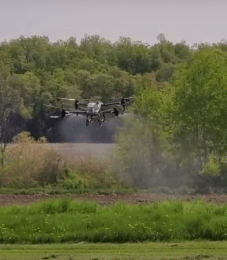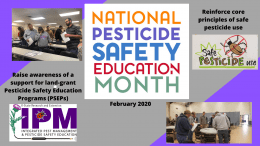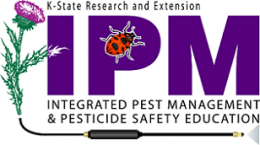By Frannie Miller, Pesticide Safety and IPM Coordinator
There is a good deal of interest in using drones, also called unmanned aerial vehicles (UAVs) for the application of pesticides. In our context, a drone is a small, remotely controlled fixed-wing or rotary-wing aircraft. A drone application might be appealing to individuals wanting to spray where it is not practical or desirable to use a traditional spray, or perhaps, for spot spraying. However, applications are limited by the size of the payload the drone is able to carry and compliance and logistics for such applications can be challenging. Downdraft can affect the deposition of the product and cause off-target movement or volatilization. If you are an applicator who is considering using a drone for applications, here is some basic information regarding licenses that you need to know before you apply any pesticides.

First, any individual who will be operating a drone for pesticide applications shall have a current Remote Pilot Certification under title 14 of the Code of Regulations (14 CFR) 107 and meet all Federal Aviation Administration (FAA) requirements. This can be achieved by taking a Commercial Remote Pilot Training course or simply taking the exam at an approved testing center. The fee to schedule an examination is usually around $175. Drones shall be operated under the applicable FAA requirements and the necessary exemptions must be obtained according to the weight of the drone being flown. A Commercial Agricultural Aircraft Operator Certificate shall be obtained if the drone does not meet the requirements for exemption.
The applicator needs to provide the Kansas Department of Agriculture with the make, model, serial number (if applicable) and any other requested information related to the drone and submit a completed and signed application to apply pesticide products. Documentation is needed to confirm that each drone is properly registered with the FAA (FAA registration certificate) and the individual flying it has the proper certification (copy of remote pilot license). The business making the applications also has to prove they have the proper certification (exemption/rule-making documentation, a Commercial Agricultural Aircraft Certificate) or has obtained the necessary exemptions to KDA.
Commercial pesticide applications via drones or unmanned aerial vehicle are only permitted in the following categories: Category 1: Agricultural Pest Control (1A: Agricultural Plant Pest Control, 1B: Agricultural Animal Pest Control, 1C: Wildlife Damage Control, 1D: Stump Treatment), Category 2: Forest Pest Control, Category 3: Ornamental and Turf Pest Control (3A: Ornamental Pest Control, 3B: Turf Pest Control), Category 5: Aquatic Pest Control, and Category 6: Right-of-Way Pest Control. The individual who is operating the drone during the pesticide application must be a certified applicator in the category that applies to the application. The business need to comply with all existing requirements for obtaining a pesticide business license.
Finally, commercial pesticide applications via drone or unmanned aerial vehicle need to comply with the label requirements of each pesticide product being applied. Remember the label is the law! Unfortunately, though, there is little clear guidance on pesticide labels that pertains to drone applications. One thing to note is that if the label prohibits aerial application then the product cannot be applied by a drone. If aerial application is permitted, the application rate and other parameters need to be in compliance with the label. Also it is important to point out, manufacturers and users are adopting commercial nozzles meant for self-propelled sprayers, which can be a concern for product deposition and coverage.


